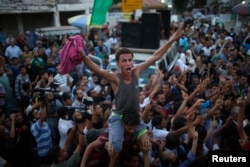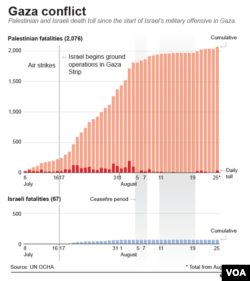Israeli and Palestinian negotiators announced Tuesday they have agreed to an open-ended cease-fire to halt seven weeks of deadly combat in Gaza.
The truce took effect at 7 p.m. local time (1600 GMT), though fighting continued up to that point, the Associated Press reported. Just before its start, mortar fired into southern Israel killed at least one Israeli. But celebratory gunfire broke out in Gaza, with mosques' loudspeakers carrying chants typically reserved for holidays.
The cease-fire was announced by Mahmoud Abbas, head of the Palestinian Authority, from his headquarters in the West Bank city of Ramallah.
Egypt brokered the deal, which calls for Israel to ease its blockade of Gaza, allowing shipments of humanitarian aid and building materials for repair and reconstruction.
A statement from Egypt's foreign ministry said indirect talks between Israel and the Palestinians should resume within a month of the cease-fire's implementation, Reuters reported. The continuing talks will address Israel's demand for disarming the militant group Hamas, which governs Gaza. Palestinians also want the opening of a seaport and airport and greater easing of the blockade.
Egypt has been appealing to Israel and Hamas to enact a cease-fire and resume negotiating an end to the fighting that erupted July 8.
Israeli cabinet members were apprised by phone of the cease-fire decision but were not asked to vote on it, Israeli senior officials told the Jerusalem Post.
Hamas spokesman Sami Abu Zuhri insisted the agreement was a "victory" for his group.
Asserting Palestinians "won" the battle, Abu Zuhri said Israeli military forces were unable to defend their people, who had to hide or flee under attack. The spokesman also said Israeli Prime Minister Benjamin Netanyahu was a failure because the operation in Gaza "achieved nothing."
Nearly two months of Israeli airstrikes in response to Hamas rocket fire have killed at least 2,133 Palestinians, most of them civilians, including close to 500 children, Palestinian health officials and the United Nations report. Sixty-four Israeli soldiers and four civilians have been killed.
The United States, which has long called for an end to the fighting, said it strongly supports the truce.
"As soon as calm is restored, the delivery of urgently needed humanitarian assistance to the people in Gaza must be accelerated," U.S. Secretary of State John Kerry said in a statement. He said the U.S. was committed to that effort and to working with international partners on rebuilding Gaza.
The United Nations has estimated that the Gaza violence has forced 475,000 Palestinians to seek refuge at its shelters.
U.N. Secretary-General Ban Ki-moon welcomed the cease-fire, saying in a statement that "it is up to the parties to live up to this responsibility. After this latest round of killing and the further widespread destruction of Palestinian homes, civilians on both sides need a reprieve. ..."
There have been several cease-fires, and on-off peace talks in Cairo. But violence resumed quickly when contentious negotiations broke down over Israel's demand that Hamas be disarmed and the Palestinians' call for an end to the Israeli blockade of Gaza.
High-rises bombed
The development followed a wave of Israeli airstrikes Tuesday that included the bombing of two Gaza City high-rise buildings. At least two people were killed, Palestinian health officials say.
One airstrike early Tuesday collapsed a 15-story office and apartment tower. Another severely damaged a second tower containing shops and offices, wounding at least 25 people, Palestinian health officials told the Associated Press.
Israel had warned people to leave the area, a tactic the military has used repeatedly before attacking sites where it says militants have been operating.
Since Saturday, the Israeli military had toppled several office buildings and shopping malls in what might have been a shift to pressure middle-class Palestinians to question Hamas tactics and end the group's barrage of cross-border rocket fire, the AP reported.
"Some people will now be wondering why Hamas did not accept a cease-fire proposal during the first week of the fighting, when the damage here was still relatively small," Mkhaimar Abu Sada, a political scientist at Gaza's Al Azhar University, told the news service.
But an Israeli military spokesman, in an email to the AP, said the strikes were "a direct result to Hamas' decision to situate their terrorist infrastructure within the civilian sphere including schools, hospitals and high-rise buildings."
Abu Karim, an eyewitness to one of the attacks Tuesday, said, "There are no rockets in the tower and there is no [Hamas] resistance in the tower. The attack on the towers is only to scare the people and make them oppose the resistance. Neither Israel nor America will be able to bring us down to our knees."
Earlier Tuesday, an Israeli military spokesman reported more rockets being fired at Israel, including one intercepted by Israel's Iron Dome defense system over Tel Aviv.
VOA's Edward Yeranian contributed to this report from Cairo. Some information also was provided by the Associated Press, Reuters and AFP.







